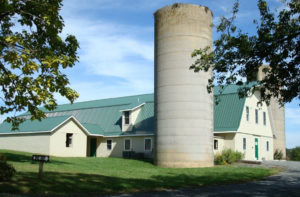services offered
complete veterinary care
We emphasize patient care above all else, and are committed to offering the best possible care for our patients. Client service and communication are essential to that goal. We believe that quality patient care begins with listening. We work closely with the client to develop the best diagnostic and therapeutic plans for the patient. Our practice offers complete veterinary care including preventative, clinical, and emergency services for our clients.
 Dr. Erskine and members of Damascus Equine Associates share an outpatient clinic located in Mount Airy, Maryland. Our clinic features two exam rooms, a riding ring and an array of diagnostic and therapeutic capabilities allowing Dr. Erskine and his associates to perform an array of diagnostic and treatment capabilities including:
Dr. Erskine and members of Damascus Equine Associates share an outpatient clinic located in Mount Airy, Maryland. Our clinic features two exam rooms, a riding ring and an array of diagnostic and therapeutic capabilities allowing Dr. Erskine and his associates to perform an array of diagnostic and treatment capabilities including:
- Digital Ultrasound
- Digital Radiography
- Gastroscopy
- Endoscopy
- Shock Wave Therapy
- PRP (Platelet Rich Plasma)
- IRAP (Interleukin -I Receptor Antagonist Protein)
- Dentistry
- Standing Surgical Procedures
- Pre-Purchase Exams
- Lameness Locator Exams
Our facility is also temperature-controlled and is comfortable during all seasons. Additionally, many procedures are discounted when performed in the clinic.
Annual dental examinations can be scheduled throughout the year. During this examination, sharp enamel points of the cheek teeth will be removed to decrease potential irritations and trauma to the soft tissues of the mouth. Abnormalities such as malocclusions, hooks, uneven or missing teeth will be noted and addressed. Most dental procedures can be performed in the standing, sedated horse at the farm or in the clinic.
Digital radiography has been one of the biggest advances in equine imaging in recent years. In addition to allowing for immediate results, digital radiography allows examination of different densities within the same image and transmission of images via email. We offer radiograph consultations with Dr. Kurt Selberg of Inside Information Radiology as well as various local hospitals.
Digital Ultrasonography utilizes ultrasound waves to create high resolution images of soft tissue structures. It is used in the evaluation of tendon and ligament injuries as well as injuries of the soft tissue structures of joints. Abdominal and thoracic examinations allow the evaluation of internal organs including the intestines, liver, heart, and lungs, to name a few. Ultrasound examinations can be performed at the farm or in the clinic.
Few things cause as much concern to the horse owner as an equine medical emergency. Acute illness, colic, injury or severe lameness can occur without warning and at any time. As a client of our practice, you and your horse have access to Damascus Equine Associates’ emergency service 24 hours a day, 7 days a week. Doctors Erskine, Welker and Schraer, along with Doctors Scullin, Radue, Lewis and Snyder rotate emergency duty and can provide emergency phone consultations or farm visits if your horse requires medical attention.
Your observations and initial assessment of your horse’s condition are very important to determine the urgency of the emergency and formulate a plan of action. Please take a few moments to collect the following information before you discuss the case with the veterinarian on call.
- Acute illness: Appetite, attitude, temperature, presence of respiratory signs (nasal discharge and/or cough), presence of gastrointestinal signs (colic and/or diarrhea).
- Colic: Degree and description of pain, temperature, appetite, presence of manure and its consistency.
- Injury: Location of injury, bleeding, drainage, swelling, sensitivity, temperature, lameness.
- Severe Lameness: Degree of lameness, swelling, sensitivity, temperature, range of motion of joints, digital pulse, signs of distress (sweating and/or increased respiratory rate).
It is also helpful to know what emergency supplies you have available (banamine, bute, antibiotics, wound ointments, bandages, etc.). We are happy to assist you in creating an emergency first aid kit.
Emergencies DURING business hours: (Monday-Friday, 8:30AM – 5:00PM)
Please call our office directly at (301) 829-4977
Emergencies AFTER business hours: (Evenings, Weekends & Holidays)
Please call our after-hours emergency number at (866) 435-7119
 Comprehensive preventative medicine is the cornerstone of excellent patient care and starts with an appropriate vaccination and parasite control program; however this is just the beginning. Dr. Erskine offers several Health Programs to meet the needs of patients and clients. These programs are managed through our office and complete medical records are maintained for each patient. Observations and consultations during these wellness visits allow discussions about general health matters as well as specific health issues facing individual horses. These programs can be customized to meet the particular needs of any patient or client.
Comprehensive preventative medicine is the cornerstone of excellent patient care and starts with an appropriate vaccination and parasite control program; however this is just the beginning. Dr. Erskine offers several Health Programs to meet the needs of patients and clients. These programs are managed through our office and complete medical records are maintained for each patient. Observations and consultations during these wellness visits allow discussions about general health matters as well as specific health issues facing individual horses. These programs can be customized to meet the particular needs of any patient or client.
Other services such as Coggins tests, wellness lab tests, dentistry, and vaccination for diseases like Strangles and Botulism can be added and will be billed separately.
Appointments will be scheduled in advance by our office, and we will remind you of your appointment by phone, email or text the week before your appointment. Please call or email our office if you have any questions about our Health Programs.
More information about our Health Programs
The Lameness Locator® is a wireless computer-assisted motion analysis system used to objectively detect and evaluate lameness patterns in the horse. Using sensors non-invasively placed on the horse, body movement data is wirelessly transmitted to a computer for analysis and storage. Because the sensors sample motion at 200 times per second, they are more sensitive than the human eye, which samples at only 20-25 times per second.
The resulting Lameness Locator® analysis report can be used to help determine whether a lameness exists, which limb or limbs are involved, the severity of the lameness, and the phase of stride (impact, mid-stance, or push off) that the lameness is most severe. This information can be used to help localize the lameness, guide further diagnostics and assess the response to therapy.
The Lameness Locator® can be used at the farm or at the clinic. It can be used to assess your horse’s current status and to track your horse’s progress over time. It can become an important part of managing your equine athlete for peak performance as well as longevity.
Rotational Deworming
Rotational deworming schedules involve deworming all horses at regular intervals with various deworming products. These programs have been very successful in controlling equine parasites thus far, but they may promote the development of parasite drug resistance.
Clinical Parasite Control
Parasite infestation in the horse is a common problem that can be effectively controlled. While there are many types of equine parasites, the most common ones are large and small strongyles, tapeworms and pinworms. These parasites can cause numerous health problems including colic, weight loss, diarrhea and general unthriftiness.
In the past, large strongyles were responsible for most of the health problems associated with equine parasitism. Traditional deworming programs, including rotational and daily deworming programs, have been highly effective in controlling large strongyles to the point that these parasites are no longer the most important cause of parasite related disease.
Currently, small strongyles represent the greatest threat to equine health from parasites. Small strongyle larvae become encysted within the walls of the intestine and can cause inflammation and intestinal disturbances. Clinical signs associated with small strongyle infection can range from mild subclinical (unnoticeable) alterations of intestinal function to life threatening intestinal disease.
A major concern with small strongyles is the increasing development of drug resistance to commonly used dewormers like benzimidazoles and pyrantel. Recently there have even been reports of resistance to ivermectin. Our new Clinical Parasite Control Program addresses the problem of emerging drug resistance in small strongyles.
The Clinical Parasite Control Program addresses the emerging problem of parasite drug resistance. This program uses quantitative fecal egg counts to determine which horses need to be dewormed more frequently and which horses can be dewormed less frequently. The subsequent reduction in the use of dewormers decreases the selective pressures for the development of parasite drug resistance.
Extracorporeal Shock Wave Therapy (ESWT) utilizes focused, high energy acoustic pressure waves to treat a variety of musculoskeletal conditions in the horse including tendon, ligament, and joint injuries. It has been shown to decrease inflammation, promote tissue regeneration and improve healing. ESWT is a non-invasive therapeutic modality that can be performed in the standing, sedated horse at the farm or in the clinic.
 Sports Medicine comprises the largest aspect of our clinical caseload. This includes lameness diagnosis, evaluations for poor performance, examinations for purchase, and diagnostic imaging as well as an array of therapeutic modalities. Your horse’s comfort and safety are best ensured by an accurate diagnosis and appropriate treatment.
Sports Medicine comprises the largest aspect of our clinical caseload. This includes lameness diagnosis, evaluations for poor performance, examinations for purchase, and diagnostic imaging as well as an array of therapeutic modalities. Your horse’s comfort and safety are best ensured by an accurate diagnosis and appropriate treatment.
Recommending the optimal diagnostic and therapeutic options for our patients is paramount. For this reason, we will refer patients elsewhere for some elements of sports medicine, such as nuclear scintigraphy, magnetic resonance imaging, and surgical intervention. The patient’s welfare is served best by a comprehensive approach to sports medicine that employs the scientific principles of veterinary medicine.

